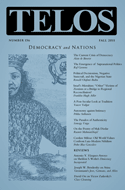Raf Geenens’s “The Emergence of Supranational Politics: A New Breath of Life for the Nation-State?” appears in Telos 156 (Fall 2011). Read the full version online at the TELOS Online website, or purchase a print copy of the issue here.
 While cosmopolitan authors are eager to forecast the demise of the nation-state, this article looks at a number of authors who believe that the emergence of supranational politics actually provides the nation-state with a new or at least an altered raison d’être. I explore two lines of argument of this kind. Some theorists fear that the development of supranational institutions will eventually bring about a “depoliticization” of collective life. We risk ending up in a “postpolitical” world where individuals no longer see themselves as political actors with responsibility for the fate of a collectivity, but are instead reduced to purely economic units. Accordingly, these authors defend the nation-state as an irreplaceable context of political agency. Other theorists fear that the concentration of powers at the supranational level risks bringing about a new kind of despotism. In response, they propose to recast nation-states in the role of “intermediary bodies” that can form a counterweight against the centralizing tendencies of supranational institutions. Assessing these two lines of argument, I conclude that the dangers these authors point to are real. I also conclude, though, that there are no reasons to assume that the nation-state is indeed the optimal “political form” to counter these alarming developments.
While cosmopolitan authors are eager to forecast the demise of the nation-state, this article looks at a number of authors who believe that the emergence of supranational politics actually provides the nation-state with a new or at least an altered raison d’être. I explore two lines of argument of this kind. Some theorists fear that the development of supranational institutions will eventually bring about a “depoliticization” of collective life. We risk ending up in a “postpolitical” world where individuals no longer see themselves as political actors with responsibility for the fate of a collectivity, but are instead reduced to purely economic units. Accordingly, these authors defend the nation-state as an irreplaceable context of political agency. Other theorists fear that the concentration of powers at the supranational level risks bringing about a new kind of despotism. In response, they propose to recast nation-states in the role of “intermediary bodies” that can form a counterweight against the centralizing tendencies of supranational institutions. Assessing these two lines of argument, I conclude that the dangers these authors point to are real. I also conclude, though, that there are no reasons to assume that the nation-state is indeed the optimal “political form” to counter these alarming developments.


